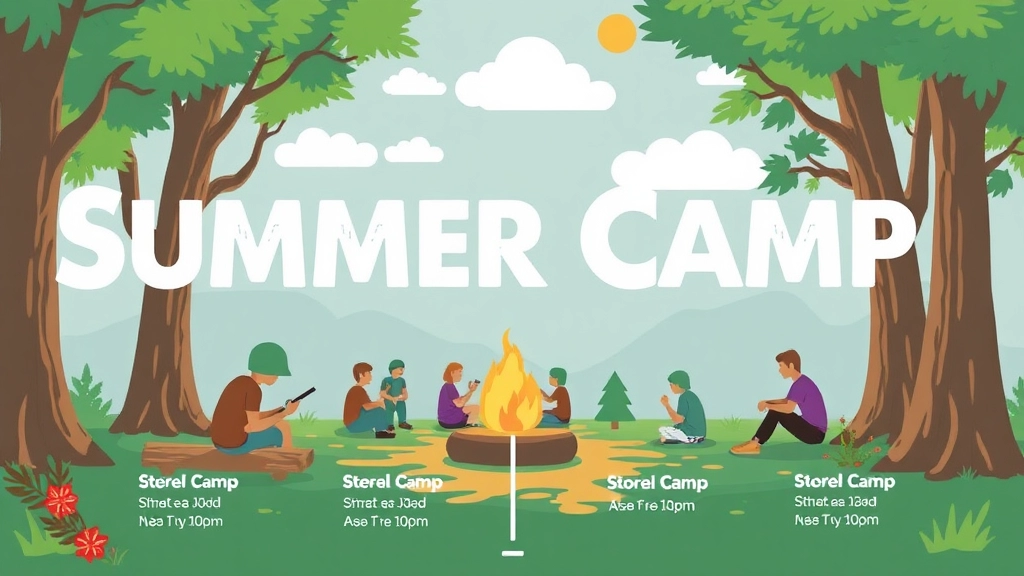Ever wondered what makes summer camp so enchanting and memorable? It’s a world with its own unique language and traditions, from the various roles and activities to the special rituals that define camp life. This article unravels the essential summer camp terminology, providing you with a comprehensive guide to navigate this vibrant environment with ease and confidence.
We’ll dive into the common camp roles and titles, decode the lingo of camp activities, and explore the slang and camp-specific phrases that can make a newcomer feel like an insider. Additionally, we’ll touch on key events, popular games, arts and crafts lingo, outdoor adventure terms, and the magical campfire culture. By the end, you’ll be well-versed in the special traditions and celebrations that make summer camp an unforgettable experience.
Common Camp Roles and Titles
Ever wondered who does what at camp? Let’s break it down in a way that’s easy to digest. Understanding the various camp roles and titles is crucial to getting the most out of your camp experience. Whether you’re a camper, a parent, or thinking about becoming a camp counselor, knowing who’s who can make all the difference.
The Key Players at Camp
Camp Director
The Camp Director is the big boss. They oversee everything, from planning activities to ensuring safety protocols are followed. Think of them as the CEO of the camp. If you have any major issues or concerns, this is the person to talk to.
Assistant Camp Director
The Assistant Camp Director is the right-hand person to the Camp Director. They help manage day-to-day operations and step in when the Camp Director is unavailable. They’re like the VP, always in the loop and ready to help.
Camp Counselors
Camp Counselors are the heart and soul of the camp. They’re the ones who interact with campers daily, lead activities, and ensure everyone is having a blast. If you’re a camper, these are your go-to people for almost anything.
Junior Counselors
Junior Counselors are usually younger and less experienced than the main counselors but are equally enthusiastic. They assist the Camp Counselors and are often campers who have graduated to a leadership role.
Activity Specialists
Activity Specialists are the experts in specific camp activities. Whether it’s archery, swimming, or arts and crafts, these folks know their stuff. They’re there to teach you new skills and make sure you’re safe while having fun.
Camp Nurse
The Camp Nurse is your health guardian. From handling minor scrapes to managing medications, they ensure everyone stays healthy. If you’re feeling unwell, this is the person to see.
Kitchen Staff
The Kitchen Staff are the unsung heroes who keep everyone fed. They work behind the scenes to prepare meals and snacks, making sure everyone has the energy to keep going.
Maintenance Crew
The Maintenance Crew keeps the camp running smoothly. They handle repairs, clean facilities, and ensure everything is in working order. Without them, the camp would literally fall apart.
Camp Activities: Understanding the Language
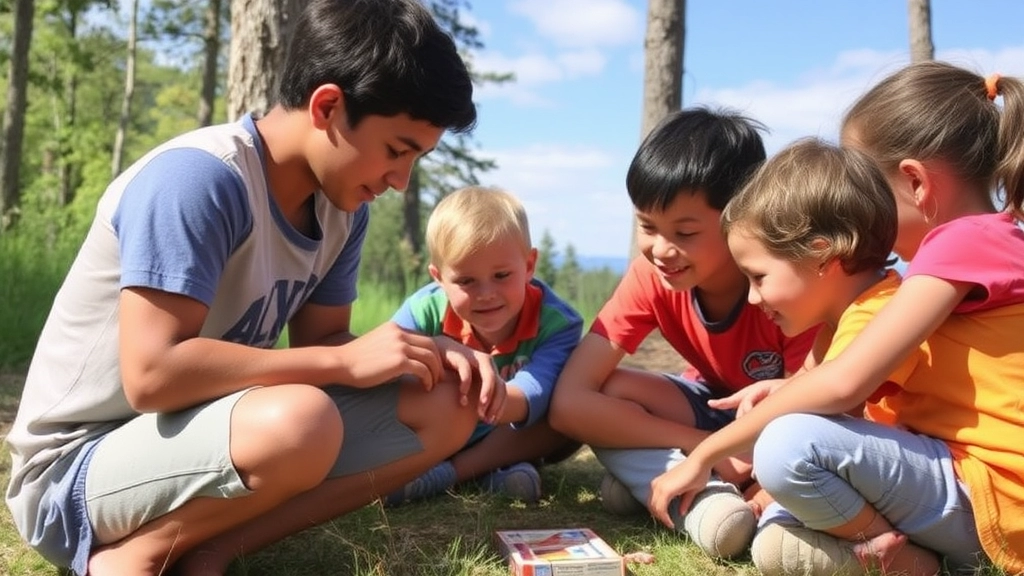
Alright, let’s dive into camp activities. Ever been to camp and felt like everyone was speaking a different language?
You’re not alone.
Camp activities have their own lingo.
We’re breaking it down so you can jump in without missing a beat.
What Are Camp Activities?
First, let’s get this straight.
Camp activities are the bread and butter of camp life.
They range from sports to arts and crafts, to outdoor adventures.
But the names and terms can be a bit… unique.
Common Terms You’ll Hear
Activity Periods
These are the blocks of time when you do specific activities. Think of them as your timetable slots.
Free Swim
Not just any swim. This is the time when you can splash around without structured lessons.
Cabin Time
This is when you hang out with your cabin mates. Could be games, chats, or just chilling.
Sports and Games
Capture the Flag
A classic. Two teams, two flags, and a whole lot of running. You gotta capture the other team’s flag and bring it back to your base.
Gaga Ball
Sounds weird, right? It’s a fast-paced game played in a pit. Think dodgeball but more intense.
Arts and Crafts
Tie-Dye
You’ll hear this a lot. It’s all about creating colourful patterns on shirts or other fabrics.
Lanyards
Making lanyards is a staple. You weave plastic threads into keychains or bracelets.
Outdoor Adventures
Hiking
Simple, right? But at camp, it’s more than just walking. It’s exploring trails, learning about nature, and maybe even spotting some wildlife.
Rappelling
Fancy word for abseiling. You’ll be descending down a rock face with a rope. Thrilling stuff.
Real Talk: Stories from the Field
I remember my first time at camp.
Everyone was talking about “Free Swim” and I thought it was some kind of special event.
Turns out, it’s just free time at the pool.
But hey, you live and learn.
Quick Tips to Fit In
- Listen and Learn: Pay attention to what others are saying and doing.
- Ask Questions: Don’t be shy. If you don’t know what something means, ask.
- Join In: The best way to learn is by doing. Jump into activities and you’ll pick up the lingo fast.
Why This Matters
Understanding the language of camp activities helps you fit in faster and enjoy your time more.
You’ll feel more confident and less like an outsider.
So, next time someone mentions “Gaga Ball” or “Cabin Time,” you’ll know exactly what they’re talking about.
Slang and Camp-Specific Phrases
Ever found yourself at camp, scratching your head over the lingo everyone seems to know? Camp life comes with its own set of slang and phrases that can leave you feeling like an outsider if you’re not in the know. Let’s dive into some of the most common camp-specific phrases that will help you fit right in and understand what’s happening around you.
Why Does Camp Have Its Own Slang?
First off, why does camp even have its own language? It’s all about community and creating a sense of belonging. When you’re surrounded by the same people day in and day out, unique phrases and slang naturally develop. These words and phrases help to build camaraderie and make the camp experience more memorable.
Common Camp Slang and Phrases
- Cabin Fever: This isn’t just a phrase for feeling cooped up. At camp, it can mean the excitement or restlessness that builds up in a cabin.
- Lights Out: The time when everyone must be in their cabins and the lights go off. It’s a universal signal for bedtime.
- KP Duty: Short for “Kitchen Patrol,” this is when campers help out with meal prep or cleaning up in the dining hall.
- Canteen: This is the camp’s snack shop where you can buy treats and sometimes small necessities.
- Bug Juice: This is a fun term for the sugary, often brightly coloured drink served at meals.
- Counsellor: Not just a supervisor but often a mentor and friend. They guide you through activities and camp life.
- Swim Test: A test to determine your swimming ability, often required before you can participate in water activities.
Examples and Stories
I remember my first camp experience vividly. I was clueless about what “KP Duty” meant. When someone said, “You’re on KP Duty tonight,” I thought it was some special mission. Turns out, I was just helping clean up after dinner, but the term made it sound so much more important.
Another time, I heard the term “Bug Juice” and genuinely thought they were serving some insect concoction. Imagine my relief when it was just fruit punch!
How to Pick Up Camp Lingo Quickly
- Listen and Observe: Pay attention to how others use these phrases.
- Ask Questions: Don’t be afraid to ask what something means. Everyone was new once.
- Use the Phrases: The best way to learn is by using the slang yourself.
Why It Matters
Understanding and using camp-specific slang isn’t just about fitting in. It’s about becoming a part of the camp culture. When you know the lingo, you feel more connected and engaged. Plus, it makes the whole experience a lot more fun. For more tips on how to prepare for camp, check out our Summer Camp Packing List.
If you’re looking to join a camp that offers a variety of activities and a welcoming environment, consider exploring the ASU Summer Camps.
Key Events and Rituals in Camp Life
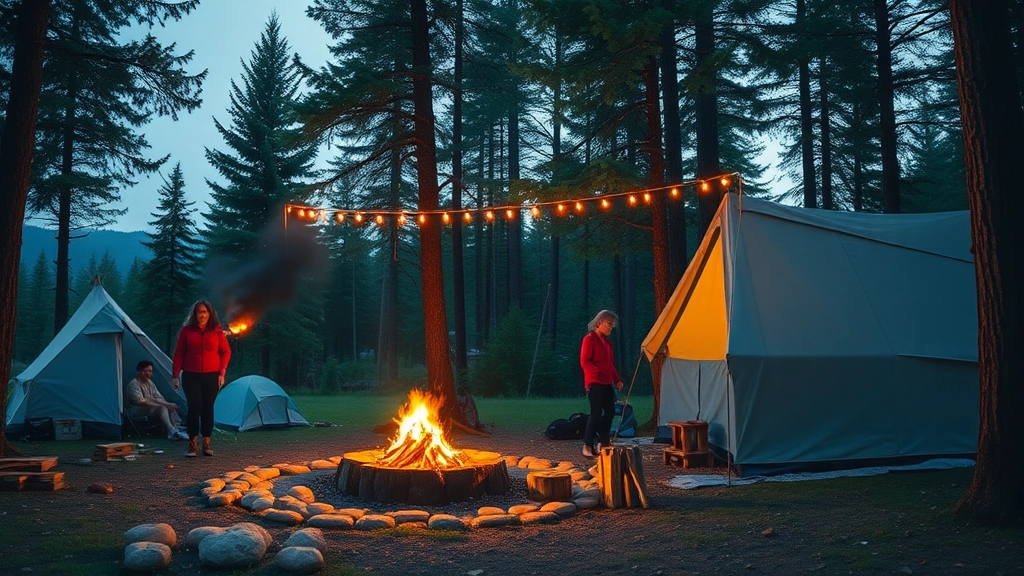
Ever wondered what makes camp life so special?
It’s all about the key events and rituals that create unforgettable memories.
These moments are the heartbeat of camp life, and trust me, they’re worth knowing.
Arrival Day: The Big Welcome
- First day jitters? Everyone’s got ’em.
- Camp staff greet you with open arms.
- Icebreaker games to help everyone settle in.
Flag Ceremonies: A Daily Tradition
- Morning and evening flag ceremonies are a big deal.
- Raise the flag to start the day, lower it to end.
- Everyone gathers, creating a sense of unity.
Campfire Nights: The Ultimate Bonding Experience
- Campfires are where the magic happens.
- Songs, stories, and chants fill the air.
- It’s all about sharing and connecting.
Talent Shows: Unleash Your Inner Star
- Got a hidden talent? Show it off!
- Talent shows let everyone shine.
- From singing to magic tricks, anything goes.
Theme Days: Mix It Up
- Dress up in crazy outfits.
- Participate in themed activities.
- Theme days add a fun twist to the routine.
Cabin Challenges: Team Spirit
- Compete in various activities.
- Build camaraderie and teamwork.
- Cabin challenges are all about friendly competition.
Closing Ceremony: A Bittersweet Goodbye
- Reflect on the journey.
- Awards and recognitions are handed out.
- The closing ceremony is a mix of joy and tears.
Camp Olympics: Go for Gold
- Multiple events, one goal: have fun.
- Teams compete in sports and games.
- The Camp Olympics bring out everyone’s competitive spirit.
Special Traditions: Unique to Each Camp
- Every camp has its own quirks.
- From secret handshakes to special songs.
- These special traditions make each camp unique.
Key events and rituals are the glue that holds camp life together.
They create a sense of belonging and make every moment count.
Ready to dive into these traditions?
They’re the secret sauce to an unforgettable camp experience.
Camp Counselor Terminology: What You Need to Know
Ever wondered what all those camp terms mean? As a camp counselor, you’re diving into a world with its own lingo. You might be asking yourself, âWhat does âKP duty’ mean?â or âWhy do they call it âtaps’?â Let’s break it down so you can hit the ground running and not feel like an outsider.
The Basics: Common Terms You’ll Hear Daily
- KP Duty: Kitchen Patrol or Kitchen Police. Basically, you’re helping out with meal prep and cleaning. Think of it as a rite of passage.
- Taps: The bugle call that signals lights out. When you hear it, it’s time for everyone to head to bed.
- Reveille: The morning bugle call to wake everyone up. It’s your alarm clock, but louder and more annoying.
- Cabin Leader: The counselor in charge of a specific cabin. You’re the go-to person for your group of campers.
- CIT (Counselor-in-Training): Someone who’s learning the ropes and shadowing experienced counselors. They’re the future of camp leadership.
Special Roles: Know Who Does What
- Program Director: The person who plans and oversees all camp activities. They’re the master scheduler.
- Waterfront Director: In charge of all water-related activities like swimming, boating, and safety. They’re the lifeguard boss.
- Arts & Crafts Specialist: The creative genius behind all the DIY projects. They make sure everyone’s got something cool to take home.
Safety First: Emergency Terms
- Code Red: A serious emergency. Everyone needs to follow specific procedures immediately.
- Buddy Check: Used during swimming activities to ensure everyone is accounted for. You’ll hear this a lot at the waterfront.
- First Aid Station: The go-to spot for any medical issues. Know where it is and who’s in charge.
Fun and Games: Activity-Specific Terms
- Capture the Flag: A popular game where two teams try to capture the other’s flag and bring it back to their base. It’s a camp classic.
- Campfire Circle: Where everyone gathers for songs, stories, and s’mores. It’s the heart of camp culture.
- Hike Leader: The counselor who leads hiking trips. They know the trails and keep everyone safe.
Real Talk: Stories from the Field
I remember my first summer as a camp counselor. The terms were flying around, and I felt like I was in a foreign country. But then, I got the hang of it. One time, during a particularly chaotic game of Capture the Flag, a camper yelled, âCode Red!â I sprinted over, heart pounding, only to find out he just wanted to show me a cool bug he found. Lesson learned: always clarify the situation.
Knowing your camp counselor terminology is crucial. It helps you fit in, keeps everyone safe, and makes the whole experience smoother for you and your campers. So, whether you’re prepping for KP duty or leading a buddy check, you’ll be ready to tackle whatever comes your way.
For more on camp roles and titles, check out our section on Packer Summer Camp: Fun, Learning, and Safety. If you’re curious about the activities you’ll be leading, head over to Summer Camp Games: Fun Without Equipment.
Popular Games and Competitions
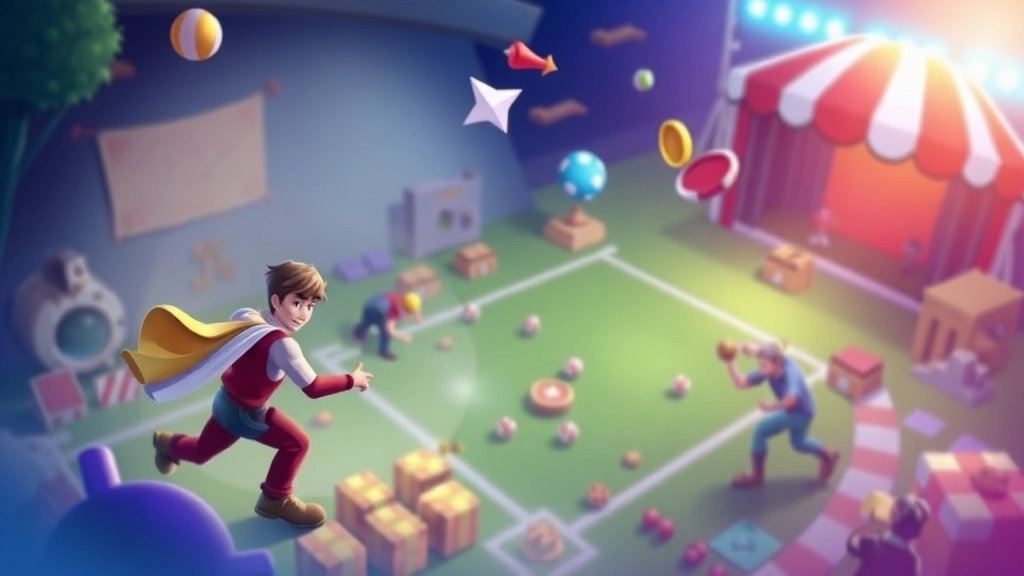
Ever felt overwhelmed by the sheer number of games and competitions at camp?
Yeah, me too.
But don’t worry, I’ve got you covered.
Let’s dive into the popular games and competitions that make camp life unforgettable.
Capture the Flag
This one’s a classic.
Capture the Flag is all about strategy and speed.
Two teams, two flags, and one mission: grab the other team’s flag and bring it back to your side.
- Divide into teams: Usually two.
- Set boundaries: Mark the playing field.
- Create jail zones: For captured players.
- Game on: Sneak, sprint, and strategise.
Tug of War
Simple, but oh-so-effective.
Tug of War is a test of strength and teamwork.
- Rope: A long, sturdy rope.
- Teams: Equal strength on both sides.
- Mark the middle: A flag or tape.
- Pull: Team that drags the other across the line wins.
Relay Races
Fast-paced and fun.
Relay races get everyone involved.
- Teams: Split into equal groups.
- Baton: Something to pass.
- Course: Set up a track.
- Run: Each member sprints a section and passes the baton.
Scavenger Hunts
Who doesn’t love a good hunt?
Scavenger hunts are about finding hidden items.
- List: Create a list of items.
- Clues: Offer hints.
- Teams: Small groups work best.
- Hunt: First team to find all items wins.
Dodgeball
A bit of chaos, a lot of fun.
Dodgeball is all about dodging and throwing.
- Teams: Two.
- Balls: Soft, foam balls.
- Court: Divide it in half.
- Aim: Hit opponents, avoid getting hit.
Talent Shows
Time to shine.
Talent shows let everyone showcase their skills.
- Acts: Singing, dancing, comedy, magic.
- Judges: Usually camp staff.
- Audience: Fellow campers.
- Perform: Best act wins, but everyone has fun.
Why These Games Matter
These popular games and competitions aren’t just for fun.
They build:
- Teamwork: Working together.
- Leadership: Taking charge.
- Confidence: Stepping out of comfort zones.
- Friendships: Bonding over shared experiences.
Arts and Crafts: Learning the Lingo
Ever wondered what all those arts and crafts terms mean at camp? Let’s dive into the lingo so you’re not left scratching your head.
Getting Started with Arts and Crafts
Are you worried about not knowing your papier-mâché from your macramé? You’re not alone. Many campers and even some counsellors feel overwhelmed by the sheer variety of arts and crafts terms. But don’t stress! Here’s a breakdown to make it all crystal clear.
Basic Terminology
- Papier-mâché: This is a technique where paper pieces are bound together using glue or paste. Think of it as the ultimate recycling project.
- Macramé: This is all about knotting strings in patterns to make decorative items like plant hangers or bracelets. It’s like friendship bracelets on steroids.
- Loom Weaving: Ever seen those cool woven wall hangings? Loom weaving is how they’re made. It involves interlacing threads on a frame called a loom.
- Kiln: This is basically an oven for firing ceramics. If you’re into pottery, you’ll get to know the kiln well.
Tools of the Trade
- Hot Glue Gun: This is your best friend for quick fixes and sticking things together securely. Just be careful not to burn yourself!
- Mod Podge: A versatile glue that also acts as a sealer. Perfect for decoupage projects.
- Acrylic Paints: These are water-based paints that dry quickly and are perfect for a variety of surfaces.
Common Projects
- Tie-Dye: Super popular at camps. You twist, tie, and dye shirts to create funky patterns. Each piece is unique, just like you.
- Friendship Bracelets: These are made using embroidery floss. It’s a great way to bond with your mates while making something cool.
- Clay Modelling: Whether it’s hand-building or using a pottery wheel, clay projects are a staple at camp.
Tips for Arts and Crafts Success
- Keep it Simple: Start with basic projects and work your way up.
- Ask for Help: Don’t be shy. Everyone’s learning, and more experienced campers or counsellors are usually happy to lend a hand.
- Be Patient: Arts and crafts can be time-consuming. Enjoy the process rather than rushing to the finish line.
Why It Matters
Arts and crafts aren’t just about making something pretty. They’re a way to express yourself, relieve stress, and bond with others. Plus, you get to take home something you made with your own hands.
Real Stories
I remember my first time trying macramé. I was all thumbs and knots, but a fellow camper helped me out. By the end of the summer, I was making plant hangers like a pro. It’s those little victories that make camp special.
If you’re looking for more inspiration, check out these summer camp craft ideas for kids or dive into the ultimate guide to summer camp layout design to make the most of your camp experience.
Outdoor Adventure Terminology
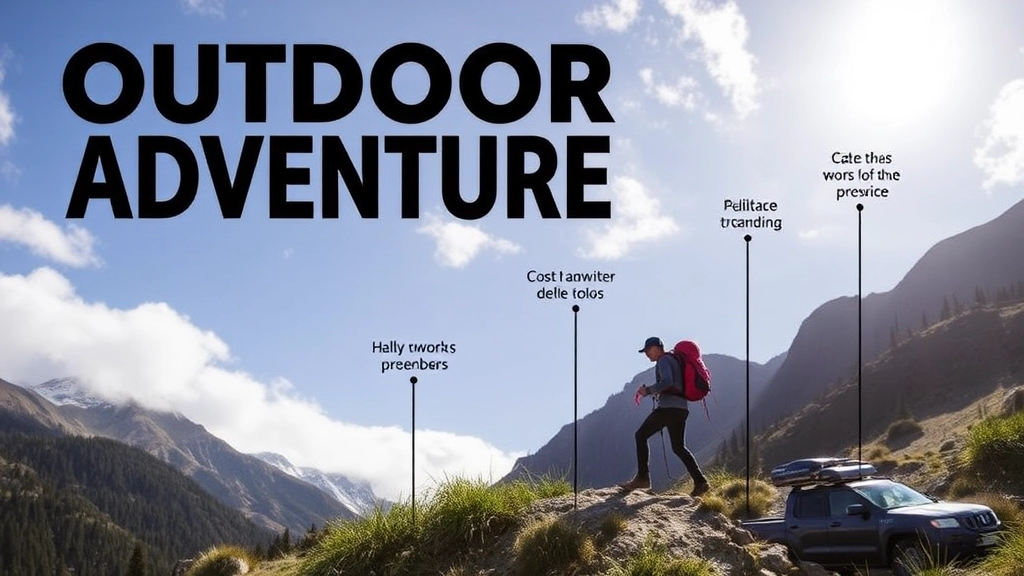
Ever felt lost when people start throwing around outdoor adventure lingo?
You’re not alone.
Let’s break it down so you can feel like a pro next time you’re out in the wild.
Key Outdoor Terms You Need to Know
Trailhead
This is where your adventure starts. The beginning of a trail. Think of it as the front door to your hiking journey.
Blazes
These are the markers on trees or rocks that guide you on the trail. Missing one can send you off course, so keep your eyes peeled.
Switchbacks
These zigzag paths help you climb steep hills without feeling like you’re scaling a wall. They make the hike more manageable.
Summit
The peak of the mountain. The top. The view you’ve been working for.
Basecamp
Your home away from home. It’s where you set up camp before making your big push to the summit.
Leave No Trace (LNT)
A set of principles to keep nature pristine. Pack out what you pack in. Simple as that.
Bear Bag/Hang
A method to keep your food away from bears. You hang your food in a tree, out of reach. Trust me, you don’t want a bear rummaging through your snacks.
Practical Tips for Outdoor Newbies
- Hydrate: Always carry more water than you think you’ll need.
- Layers: Dress in layers. Weather can change in a snap.
- Map and Compass: GPS is great, but always have a backup.
- First Aid Kit: Better safe than sorry.
Stories from the Trail
I remember my first hike. I didn’t know what a switchback was.
I tried to go straight up the hill.
Big mistake.
By the time I figured it out, I was exhausted.
Switchbacks saved my legs and my sanity.
Why This Matters
Understanding these terms makes you more confident.
You’ll enjoy the experience more when you’re not constantly wondering what people are talking about.
Campfire Culture: Songs, Stories, and Chants
Ever wondered why campfires hold such a special place in camp life? Let’s dive into the magic of campfire culture, where songs, stories, and chants bring everyone together. Whether you’re a seasoned camper or a newbie, understanding this tradition can make your camp experience unforgettable.
Why Are Campfires So Special?
Campfires are the beating heart of camp life. They’re where we gather after a long day, share laughs, and bond over shared experiences. But what makes them so unique?
- Community Building: Campfires create a sense of unity. Sitting around the fire, you feel part of something bigger.
- Relaxation: The warmth and light of the fire help everyone unwind.
- Entertainment: Songs, stories, and chants keep everyone engaged and entertained.
Songs: The Soundtrack of Campfire Nights
Songs are the lifeblood of campfire culture. They range from classic campfire songs to those unique to your camp. Here’s what you need to know:
- Classic Campfire Songs: Think âKumbaya,â âThis Land Is Your Land,â and âCountry Roads.â These songs are easy to sing and everyone knows them.
- Camp-Specific Songs: Each camp has its own set of songs that are passed down from generation to generation. Learn them, love them, and sing them loud.
- Action Songs: These are interactive songs that involve hand movements or dance steps. They’re a hit with kids and keep the energy high.
Stories: Tales That Transport You
Stories around the campfire are more than just tales; they’re a way to pass down traditions and teach lessons. Here’s how to make the most of them:
- Ghost Stories: A staple of any campfire, these stories add a thrill to the night. Just spooky enough to give you chills, but not so scary that you can’t sleep.
- Heroic Tales: Stories of bravery and adventure that inspire and motivate.
- Personal Anecdotes: Sharing personal stories can help everyone get to know each other better. It’s a great way to bond and build trust.
Chants: Keeping the Energy Up
Chants are short, repetitive phrases that everyone can join in on. They’re perfect for keeping the energy up and creating a sense of unity.
- Call and Response: One person calls out a phrase, and everyone else responds. It’s simple but effective.
- Rhythmic Clapping: Adding claps or stomps to chants makes them more engaging.
- Team Cheers: Perfect for boosting team spirit, especially during competitions.
How to Lead a Campfire Session
Leading a campfire session is an art. Here are some tips to make it memorable:
- Plan Ahead: Know the songs, stories, and chants you want to include.
- Read the Crowd: Adjust the energy level based on how the group is feeling.
- Get Everyone Involved: Encourage participation from everyone, even the shy ones.
- Keep It Fun: The goal is to have fun, so keep things light and enjoyable.
Real Questions and Worries
You might be wondering, “What if I don’t know any songs or stories?” or “What if no one participates?” Don’t worry, everyone starts somewhere. The key is to be enthusiastic and inclusive. People will follow your lead if you’re having fun.
For more tips on creating an engaging camp experience, check out our guide on summer camp cooking classes for kids and teens. If you’re interested in other camp activities, our article on indoor summer camp games for all ages has some great ideas to keep everyone entertained.
Special Traditions and Celebrations
Ever wondered what makes camp life so unique and memorable?
It’s all about special traditions and celebrations.
Let’s dive into what makes these moments unforgettable.
Why Are Traditions and Celebrations So Important?
First off, traditions and celebrations are the glue that holds camp life together.
They create a sense of community and belonging.
Plus, they’re just plain fun.
Common Camp Traditions
- Opening and Closing Ceremonies: These are the bookends of your camp experience. Think of them as the grand kickoff and the heartfelt goodbye.
- Campfire Nights: Picture thisâeveryone gathered around a roaring fire, sharing stories, singing songs, and making s’mores. It’s a classic for a reason.
- Theme Days: Ever dressed up as your favourite superhero or had a day dedicated to pirates? Theme days are a blast and break the routine.
Celebrations You Can’t Miss
- Talent Shows: Got a hidden talent? This is your time to shine. Whether it’s singing, dancing, or magic tricks, talent shows are a highlight.
- Colour Wars: Imagine an all-out, camp-wide competition where everyone is divided into teams. It’s intense, it’s fun, and it’s all about teamwork.
- Awards Night: Who doesn’t love a bit of recognition? From “Best Camper” to “Most Enthusiastic,” awards night celebrates everyone’s unique contributions.
Real Stories from Campers
One time, during a colour war, my team was trailing behind. But we pulled together, gave it our all, and ended up winning. The celebration that night was epic.
Or, take the talent show. I was nervous, but the applause and cheers made it worth it. It’s a memory I’ll never forget.
Why You Should Care
These traditions and celebrations aren’t just funâthey’re life lessons in disguise.
- Teamwork: Colour wars teach you to work together.
- Confidence: Talent shows boost your self-esteem.
- Community: Campfires and ceremonies make you feel like you belong.
How to Get the Most Out of Camp Traditions
- Participate: Dive in headfirst. The more you engage, the more you’ll get out of it.
- Be Open: Try new things. You might discover a hidden talent or a new passion.
- Make Friends: These moments are perfect for bonding. You’ll make friends for life.
Embrace the special traditions and celebrations at camp, and you’ll leave with stories to tell for years to come. For more ideas on how to make the most of your camp experience, check out our Summer Camp Team Building Activities Guide and discover the Best Summer Camp Group Games to keep the fun going.
FAQs on Summer Camp Terminology
What are camp activities?
Camp activities are the core experiences of camp life, ranging from sports and games to arts and crafts and outdoor adventures. They are designed to be fun, engaging, and educational.
What does “Activity Periods” mean?
Activity Periods are specific blocks of time allocated for different activities, much like timetable slots in school.
What is “Free Swim”?
Free Swim refers to a period when campers can swim freely without structured lessons or instructions.
What happens during “Cabin Time”?
Cabin Time is when campers spend time with their cabin mates, engaging in various activities like games, chats, or just relaxing together.
What is “Capture the Flag”?
Capture the Flag is a popular camp game where two teams compete to capture each other’s flag and bring it back to their base.
What is “Gaga Ball”?
Gaga Ball is a fast-paced game played in a pit, similar to dodgeball but more intense.
What does “Tie-Dye” involve?
Tie-Dye involves creating colorful patterns on shirts or other fabrics using dye.
What are “Lanyards” in camp terminology?
Lanyards are woven keychains or bracelets made from plastic threads, a common camp craft activity.
What is “Rappelling”?
Rappelling is the act of descending down a rock face using a rope, also known as abseiling.
What is the significance of “Flag Ceremonies” at camp?
Flag Ceremonies are daily traditions where the camp raises the flag in the morning and lowers it in the evening, fostering a sense of unity among campers.
What are “Campfire Nights”?
Campfire Nights are special evenings where campers gather around a campfire to share songs, stories, and chants, creating a strong sense of community.
What happens during a “Talent Show”?
During a Talent Show, campers get to showcase their skills in various acts like singing, dancing, comedy, or magic in front of their peers and camp staff.
What are “Theme Days”?
Theme Days are special days where campers dress up in costumes and participate in themed activities, adding a fun twist to the camp routine.
What is the purpose of “Cabin Challenges”?
Cabin Challenges are friendly competitions between cabins, designed to build camaraderie and teamwork among campers.
What are “Camp Olympics”?
The Camp Olympics are a series of competitive events where teams compete in various sports and games, fostering a spirit of fun and competition.
What does “Trailhead” mean in outdoor adventure terminology?
The Trailhead is the starting point of a trail, essentially the front door to your hiking journey.
What are “Blazes” on a trail?
Blazes are markers on trees or rocks that guide hikers along a trail, ensuring they stay on the correct path.
What are “Switchbacks” in hiking?
Switchbacks are zigzag paths that help hikers climb steep hills more manageably, reducing the effort needed compared to going straight up.
What is “Leave No Trace (LNT)”?
Leave No Trace (LNT) is a set of principles aimed at keeping nature pristine by ensuring that hikers pack out what they pack in and leave no impact on the environment.
What is a “Bear Bag/Hang”?
A Bear Bag/Hang is a method of keeping food away from bears by hanging it in a tree, out of their reach, to prevent them from rummaging through campers’ supplies.
Why is understanding camp terminology important?
Understanding camp terminology helps campers fit in faster, feel more confident, and enjoy their time more by knowing exactly what activities and terms mean.
References
-
Understanding Camp Lingo
-
Camp Activities
-
Camp Games and Activities

